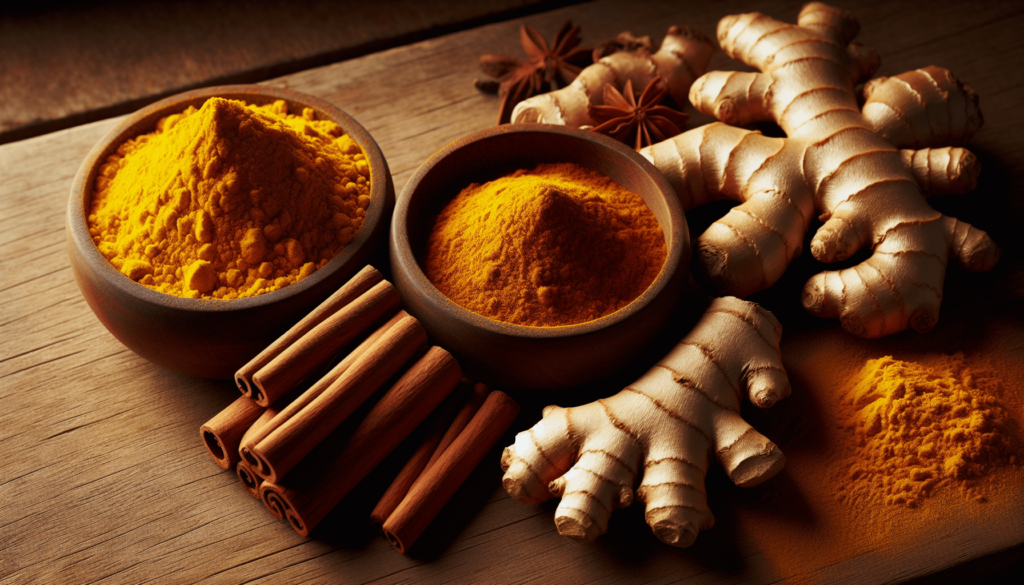Spices have been cherished for centuries not only for their ability to enhance the flavors of our favorite dishes, but also for their potential health benefits. In this article, we will explore the incredible ways in which spices like turmeric, cinnamon, and ginger contribute to our overall well-being. From their antioxidant properties to their potential anti-inflammatory effects, these spices have captured the attention of both chefs and health enthusiasts alike. So, grab a cup of ginger tea, sprinkle some cinnamon on your oatmeal, and let’s uncover the remarkable ways these flavorful additions can contribute to a healthier and happier you.

Spices and their Health Benefits
Spices are not only known for their ability to enhance the flavors of our favorite dishes, but they also offer a wide range of health benefits. Incorporating spices like turmeric, cinnamon, and ginger into your diet can contribute to your overall well-being and support various aspects of your health. From antioxidant properties to potential cancer prevention, let’s explore the numerous health benefits of these powerful spices.
Turmeric
Curcumin as the Active Compound
Turmeric, a golden-yellow spice commonly used in Indian cuisine, owes its health benefits to its active compound called curcumin. Curcumin is known for its potent antioxidant and anti-inflammatory properties, making turmeric one of the most beneficial spices for promoting optimal health.
Powerful Anti-Inflammatory Effects
Inflammation is a crucial part of the body’s immune response, but chronic inflammation can lead to various diseases. Turmeric, with its high curcumin content, has been shown to reduce inflammation in the body, potentially alleviating symptoms of conditions such as arthritis and inflammatory bowel disease.
Potential Cancer Prevention
Studies have also suggested that curcumin may play a role in preventing and even treating certain types of cancer. The antioxidant properties of curcumin help protect cells from damage and inhibit the growth of cancer cells, making turmeric a valuable addition to a cancer-preventive diet.
Improved Brain Function
Curcumin has shown promise in supporting brain health and protecting against age-related cognitive decline. It crosses the blood-brain barrier, allowing it to enter the brain and potentially reduce the risk of neurodegenerative diseases such as Alzheimer’s.
Enhanced Heart Health
Heart disease is a leading cause of death worldwide. Fortunately, turmeric may help improve heart health by reducing inflammation and oxidative stress, as well as improving cholesterol levels and blood vessel function. Including turmeric in your diet could contribute to a healthier heart.
Cinnamon
Rich in Antioxidants
Cinnamon is not only a delicious and aromatic spice but also a powerhouse of antioxidants. Antioxidants help protect the body from free radicals, unstable molecules that can damage cells and contribute to various diseases, including heart disease and cancer.
Anti-Inflammatory Effects
Similar to turmeric, cinnamon also possesses anti-inflammatory properties. By reducing inflammation in the body, cinnamon may help alleviate symptoms of inflammatory conditions like arthritis and protect against chronic diseases.
Improved Insulin Sensitivity
Cinnamon has been found to enhance insulin sensitivity and lower blood sugar levels. This is particularly beneficial for individuals with diabetes or those at risk of developing it. Adding cinnamon to your diet may help stabilize blood sugar levels and improve overall metabolic health.
Lower Blood Sugar Levels
High blood sugar levels can lead to various health complications, including diabetes and cardiovascular disease. Cinnamon has demonstrated the ability to lower blood sugar levels by increasing insulin sensitivity and inhibiting enzymes that regulate glucose metabolism.
Potential Cancer Prevention
Some studies suggest that cinnamon extract may help inhibit the growth of cancer cells and induce cancer cell death. However, more research is needed to fully understand the potential cancer-preventive effects of cinnamon and its active compounds.
Ginger
Anti-Inflammatory and Antioxidant Properties
Like turmeric and cinnamon, ginger also exhibits powerful anti-inflammatory and antioxidant properties, making it a valuable spice for promoting overall health and well-being.
Relief from Digestive Issues
Ginger has a long history of use as a natural remedy for digestive issues. It can help alleviate symptoms such as nausea, bloating, and indigestion. Ginger’s anti-inflammatory properties may also help reduce inflammation in the gut, promoting better digestion.
Reduced Muscle Pain and Soreness
For centuries, ginger has been used to alleviate muscle pain and soreness. Its analgesic and anti-inflammatory properties make it a popular choice for athletes and individuals experiencing muscle discomfort. Consuming ginger before or after exercise may help reduce exercise-induced muscle soreness.
Lower Risk of Heart Disease
Heart disease is a significant health concern, and ginger may contribute to its prevention. Studies have shown that ginger can help lower cholesterol levels, blood pressure, and markers of inflammation—all of which are risk factors for heart disease.
Potential Cancer Prevention
Ginger and its bioactive compounds have been shown to exhibit anti-cancer properties in both in vitro and in vivo studies. Ginger extracts have demonstrated the ability to inhibit the growth of cancer cells and induce apoptosis, highlighting its potential as a natural cancer preventive.
Spice Consumption Recommendations
Moderation and Balance
While spices offer various health benefits, it’s essential to consume them in moderation and maintain a balanced diet. Excessive consumption of spices may lead to digestive issues or interact with certain medications. Remember, moderation is key for reaping the benefits of spices while minimizing potential risks.
Incorporating Spices into Daily Diet
To enjoy the health benefits of turmeric, cinnamon, and ginger, consider incorporating them into your daily diet. You can add turmeric to curries, smoothies, or even sprinkle it on roasted vegetables. Cinnamon blends well with oatmeal, baked goods, and hot beverages like tea or coffee. Ginger can be used in stir-fries, soups, smoothies, or brewed as a warming tea.
Preferred Cooking Methods
To maximize the health benefits of these spices, it’s important to know the preferred cooking methods. Turmeric is fat-soluble, meaning it is best absorbed when consumed with a source of fat, such as olive oil. Heating turmeric in oil or combining it with black pepper can enhance its absorption. Cinnamon and ginger can be used in various recipes and consumed in their raw or cooked forms to enjoy their health-promoting properties.
Combining Spices for Enhanced Benefits
While each spice on its own offers numerous health benefits, combining them can potentially enhance their effects. For example, combining turmeric with black pepper increases the absorption of curcumin. Similarly, ginger and cinnamon can be paired together in recipes to create a flavorful and health-boosting combination.
Research and Studies
Scientific Studies on Turmeric
Numerous scientific studies have explored the health benefits of turmeric and its active compound, curcumin. Research has highlighted its potential in reducing inflammation, fighting cancer, improving brain health, and promoting heart health. These studies provide credible evidence for the therapeutic potential of turmeric in maintaining overall well-being.
Clinical Trials on Cinnamon
Clinical trials have shed light on the potential health benefits of cinnamon. These trials have explored its effects on blood sugar control, insulin sensitivity, and lipid profiles. While the results are promising, further research is needed to establish specific dosage recommendations and fully understand the mechanisms behind cinnamon’s health effects.
Ginger’s Effect on Health
Numerous studies have investigated the health benefits of ginger, focusing on its anti-inflammatory, antioxidant, and anticancer properties. These studies indicate ginger’s potential in relieving digestive issues, reducing muscle pain, improving heart health, and aiding in cancer prevention. Further research is ongoing to unravel the full scope of ginger’s health-promoting effects.
Combination of Spices in Research
Emerging research has also explored the potential synergistic effects of combining spices like turmeric, cinnamon, and ginger. Studies suggest that combining these spices may enhance their antioxidant and anti-inflammatory properties, leading to greater health benefits. However, more research is needed to fully understand the synergistic effects and optimal spice combinations.
Possible Side Effects
Allergies and Sensitivities
While spices are generally safe for consumption, it’s important to be aware of potential allergies or sensitivities. Some individuals may be allergic to certain spices like cinnamon or ginger, leading to adverse reactions such as skin rashes, digestive discomfort, or respiratory issues. If you experience any allergic symptoms after consuming spices, it’s important to seek medical advice.
Interaction with Medications
Certain spices, including turmeric, cinnamon, and ginger, may interact with certain medications. For example, they can enhance the effects of blood-thinning medications, potentially increasing the risk of bleeding. It’s crucial to consult with your healthcare provider if you’re taking any medications to ensure they won’t interact negatively with spices.
Digestive Issues
Spices can stimulate the digestive system and, in some cases, cause discomfort, especially when consumed in large amounts or by individuals with sensitive stomachs. If you experience digestive issues like heartburn, bloating, or diarrhea after consuming spices, it’s advisable to reduce your intake or seek guidance from a healthcare professional.
Pregnancy and Breastfeeding Considerations
During pregnancy and breastfeeding, it’s important to exercise caution when consuming spices. While they offer health benefits, certain spices in high doses may not be safe during these periods. It’s advisable to consult with your healthcare provider to determine safe and appropriate spice consumption during pregnancy and breastfeeding.
Conclusion
Spices such as turmeric, cinnamon, and ginger can be delightful additions to your meals while simultaneously promoting your overall health and well-being. From their antioxidant and anti-inflammatory properties to potential cancer prevention, these spices offer numerous benefits. It’s important to remember to consume spices in moderation and balance, incorporating them into your daily diet to experience their full potential. Consulting with healthcare professionals can provide personalized guidance based on your individual needs. So spice up your meals and enjoy the natural health boosters that these flavorful spices have to offer.
